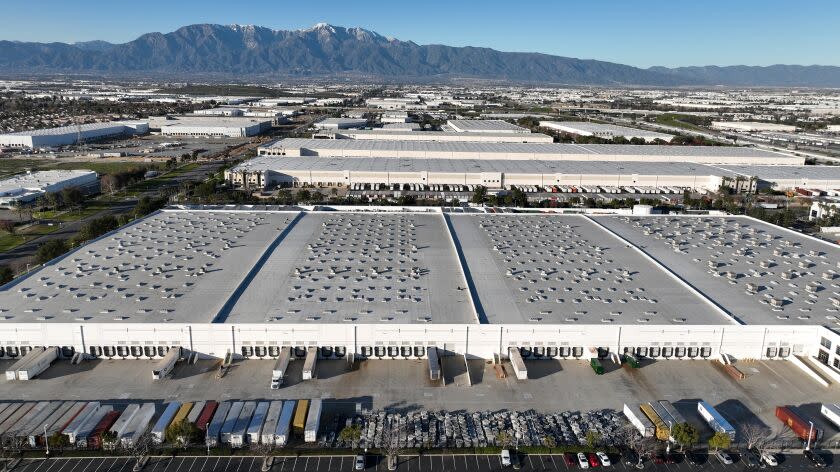Letters to the Editor: Warehouses and big rigs are crowding people out of the Inland Empire

To the editor: I am not against warehouses, but I am against building them next to residences, schools and healthcare facilities. ("Warehouse boom transformed Inland Empire. Are jobs worth the environmental degradation?" Feb. 5)
San Bernardino and Riverside counties remain among the most polluted areas in the nation. And a primary cause of this pollution is the exhaust from the thousands of diesel trucks that travel to and from warehouses every day.
Putting warehouses and big rigs close to residential communities causes respiratory disease, creates serious traffic problems and reduces the value of residential property. This is especially harmful in senior communities, where many residents live on limited, fixed incomes.
Sadly, many warehouse developers and sympathetic officials have approved putting warehouses anywhere. For example, the city of Banning recently approved putting a mega-warehouse across the street from a large senior community and an assisted living center, prompting a lawsuit by residents.
It is time for officials to make the health, safety and economic well-being of their residents a priority.
Steve Mehlman, Beaumont
..
To the editor: The print headline for the article was, "Where the warehouses are." It could have been called, "Where the solar panels aren't."
Your front-page photo showed acres and acres of flat, sun-baked roofs of Inland Empire warehouses and not a solar panel in sight. How is this possible? What a missed opportunity.
How are we ever going to get out of our climate mess if we don't start putting solar panels on every roof we can find?
When the San Bernardino County Board of Supervisors approves a warehouse the size of 56 football fields (56 football fields!), requiring solar panels is low-hanging fruit and should be nonnegotiable.
Sarah Tamor, Santa Monica
..
To the editor: Are the jobs created by the influx of Inland Empire warehouses worth the environmental degradation? I'd answer your thought-provoking question with a resounding no.
Elected officials who approve endless warehouse projects hoping for economic rewards are making a fool's bargain. The warehouse industry has serious and lasting consequences for the region's public health, property values and the local economy.
The Inland Empire has the highest share of employment in low-wage sectors of any region in the state and has the highest concentrations of ozone — smog's main ingredient — in the state and the country.
These obvious warning signs should prompt a pause and careful consideration of the next massive logistics hub proposal. Do residents need another warehouse in exchange for grueling, low-paying jobs that will soon be automated? Or do they need leaders who prioritize their health, the environment and living-wage jobs?
Frances Tinney, Berkeley
This story originally appeared in Los Angeles Times.

